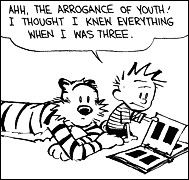
Posted on 12/17/2010 7:31:07 AM PST by marshmallow
Back when I first joined YIMCatholic, I was going to write posts about my conversion. I hammered out seven posts in pretty rapid succession and then, I stopped writing them until recently.
Many of my posts now are simply my observations of the world which are colored through the lens of a convert to Catholicism. It would be difficult for them not to be. Other posts I've written are of the "look what I just found!" variety, and the "I want to share this with you" type. Call them the discovery posts if you will.
Recently I gave a talk on the Communion of Saints for my parishes RCIA group. Consequently, I've been answering questions of potential converts that have prompted me to explain my conversion to others.
Basically, this has resulted in my having become a neophyte evangelist of sorts for the Church. And though this blog space isn't the forum for heavy-duty apologetics, because others do that better elsewhere, I have always seen my role here at YIMC as one of evangelizing.
Back to my conversion story, when I was first confronting the idea of becoming a Catholic, I had to look hard at the question "Why am I Protestant?" Having just moved cross-country following my retirement from the Marines, I found out that my mother no longer went to church where we had gone when I was growing up. Instead of the non-denominational church I grew up in (and which we were a founding family of), I learned that she now went to a Presbyterian church instead. Hmmm.
Rather than start visiting all kinds of churches, which appealed to me about as much as shopping for a new car, my family and I kept going to the local Catholic parish in our new town while I did research and home improvement projects. One of the first things I looked into was the problem of Catholics and their obviously misguided devotion to the Virgin Mary.
The funny thing is, I had sat in the pews in the Catholic Church with my wife for close to 18 years and I had never really noticed any wacky or overly zealous devotion to Mary. Not at Mass, anyway, and as we didn't stick around much after the conclusion of Mass, I didn't see anything that made me uncomfortable. Truthfully, I was surprised about this and it's probably a big reason why I continued to sit in the pews with my patient Catholic wife for that long a time.
This didn't stop me from believing that weird Marian devotions were happening though, and I assumed talk of her perpetual virginity was just "crazy talk." Like most, I had no idea what the Immaculate Conception was either and I just thought people were referring to Our Lord's conception. I was ignorant, plain and simple. But I had in mind a mission to correct the wrong religious track that my family was on so I started planning the military campaign to retake the spiritual territory I had ceded to the Church. My first target was what I thought would be the easiest: Mary.
Before I went on my "destroy Marian Devotion" offensive, though, I knew I would have to do a little homework. Planning ahead, you see, I figured the best place to start was with the guys who picked up the Protestant Reformation football and ran with it for touchdowns. Follow the winners Frank, and victory will be yours!
But get this. Much to my surprise, nay, shock(!) I had to throw a penalty flag on myself and look for a different angle of attack. Because what I found out was that the Big Three "Reformers" all agreed with the Catholic Church's teachings on the Mother of God!
Here is what I found, courtesy of the site catholicapologetics.info,
Martin Luther:
Mary the Mother of God
Throughout his life Luther maintained without change the historic Christian affirmation that Mary was the Mother of God:
"She is rightly called not only the mother of the man, but also the Mother of God ... It is certain that Mary is the Mother of the real and true God."
Perpetual Virginity
Again throughout his life Luther held that Mary's perpetual virginity was an article of faith for all Christians - and interpreted Galatians 4:4 to mean that Christ was "born of a woman" alone.
"It is an article of faith that Mary is Mother of the Lord and still a Virgin."
The Immaculate Conception
Yet again the Immaculate Conception was a doctrine Luther defended to his death (as confirmed by Lutheran scholars like Arthur Piepkorn). Like Augustine, Luther saw an unbreakable link between Mary's divine maternity, perpetual virginity and Immaculate Conception. Although his formulation of the doctrine of the Immaculate Conception was not clear-cut, he held that her soul was devoid of sin from the beginning:
"But the other conception, namely the infusion of the soul, it is piously and suitably believed, was without any sin, so that while the soul was being infused, she would at the same time be cleansed from original sin and adorned with the gifts of God to receive the holy soul thus infused. And thus, in the very moment in which she began to live, she was without all sin..."
Assumption
Although he did not make it an article of faith, Luther said of the doctrine of the Assumption:
"There can be no doubt that the Virgin Mary is in heaven. How it happened we do not know."
Honor to Mary
Despite his unremitting criticism of the traditional doctrines of Marian mediation and intercession, to the end Luther continued to proclaim that Mary should be honored. He made it a point to preach on her feast days.
"The veneration of Mary is inscribed in the very depths of the human heart."
"Is Christ only to be adored? Or is the holy Mother of God rather not to be honoured? This is the woman who crushed the Serpent's head. Hear us. For your Son denies you nothing." Luther made this statement in his last sermon at Wittenberg in January 1546.
John Calvin:
It has been said that John Calvin belonged to the second generation of the Reformers and certainly his theology of double predestination governed his views on Marian and all other Christian doctrine . Although Calvin was not as profuse in his praise of Mary as Martin Luther he did not deny her perpetual virginity. The term he used most commonly in referring to Mary was "Holy Virgin".
"Elizabeth called Mary Mother of the Lord, because the unity of the person in the two natures of Christ was such that she could have said that the mortal man engendered in the womb of Mary was at the same time the eternal God."
"Helvidius has shown himself too ignorant, in saying that Mary had several sons, because mention is made in some passages of the brothers of Christ." Calvin translated "brothers" in this context to mean cousins or relatives.
"It cannot be denied that God in choosing and destining Mary to be the Mother of his Son, granted her the highest honor."
"To this day we cannot enjoy the blessing brought to us in Christ without thinking at the same time of that which God gave as adornment and honour to Mary, in willing her to be the mother of his only-begotten Son."
Ulrich Zwingli:
"It was given to her what belongs to no creature, that in the flesh she should bring forth the Son of God."
"I firmly believe that Mary, according to the words of the gospel as a pure Virgin brought forth for us the Son of God and in childbirth and after childbirth forever remained a pure, intact Virgin." Zwingli used Exodus 4:22 to defend the doctrine of Mary's perpetual virginity.
"I esteem immensely the Mother of God, the ever chaste, immaculate Virgin Mary."
"Christ ... was born of a most undefiled Virgin."
"It was fitting that such a holy Son should have a holy Mother."
"The more the honor and love of Christ increases among men, so much the esteem and honor given to Mary should grow."
I remember being blown away by these revelations. I had gone to Christian churches my whole life and I had been told what I was supposed to believe, and I had never been told these things about Mary. I felt a little bit like the fellow wearing tan below, even though I was really acting like the guy wearing black.
And then I thought, "methinks they dost protest too much." And like young Skywalker above, I too leaped with faith and lived to tell the tale. I didn't land on my feet though. Instead, I landed in the lap of Blaise Pascal.
And so began the process of my going back to the Scriptures and to the Church Fathers and back through the history of the Catholic Church, and finally back into the arms of Christ's Church Herself.
Perhaps this post is a prequel in the 2BFrank saga. Sheeeesh!
To read more about the Protestant Reformers views on the Blessed Virgin Mary, and to track down the footnotes too, head on over to catholicapologetics.info. Head over to Scripture Catholic too, and bring your Bibles. Then head over to the Vatican and look at the Catechism of the Catholic Church as well.
I never called her mediator. I called her an intercessor, an office which is not hers alone. All of us can be intercessors.
Co-redeemer simply means that she worked with Christ in the process of redemption. That’s all. I know you think it means something else, but that’s all we mean when we use the term. How did she work with Christ. She was his mother and raised him.
I’m not going to stop believing that she’s sinless. I think that the Church is right here. I disagree that acknowledging the blessing that Christ gave her diminishes him. She did not make herself sinless, Christ did.
She’s not a fallen creature, thanks to Christ!
“What I find most amusing is that it’s their tradition that says tradition is equal to Scripture in authority.”
Does this mean that tradition is contrary to scripture? No.
Is there any passage which states that Mary herself sinned?
Actually, you are quite wrong.
Nestorius denied the use of the word Theotokos, as you do here, and was condemned for Heresy.
Theotokos means ‘God bearer’, and is where the term ‘mother of God’ originates, and was in use long before the 5th century.
Well, since the question seems to set up a differentiation of definitions, let me ask you: what is YOUR definition of veneration? Does it involve bowing the knee before a statue or icon? Why? One poster has already proven that Roman Catholics pray to Mary; why pay any veneration (or in my view, worship) to any saint?? Who made those people saints? God? No — a group of humans elevated other humans to positions where they have no authority. Scripture states plainly that all who are saved—past, present, and future—are “The Saints.”. God and God alone confers that honorific through his election of and grace to those he calls saves through the blood of his son Jesus! Is not our duty to worship God?
Then, if so, why venerate anyone long gone from this earth? Why not do our duty and worship, venerate, and honor the one, true living God —the only one worthy of worship — instead?
We have access to the Creator of the Universe; if you take time to venerate/worship or pray to anyone/qnything else, you’re replacing God by misusing that time. That is idolatry.
Hoss
That’s true, except we do know that some people, Enoch and Elijah were carried up into heaven.
The argument for her bodily assumption is that it all fits together. Her immaculate conception, her sinlessness and the assumption. The wages of sin are death. As Mary was sinless, death could not claim her and so she was bodily assumed into heaven.
Here is what we do know:
St. Juvenal, the then Bishop of Jerusalem, stated at the Council of Chalcedon (451), that Mary had died in the presence of the Apostles, but the Apostles opened her tomb they found her body missing. They then concluded that she had been bodily assumed into heaven.
This was investigated by the Council and confirmed.
This is why it’s not in the Vulgate. It may have been known previously, but we don’t have any documentation.
Oh, please. If that’s the case, grow up and apologize to me for insulting me by calling into question my intelligence by suggesting I learn logic and English by going to community college.
I mean really.
Hoss
“a group of humans elevated other humans to positions where they have no authority.”
An interesting view, but entirely wrong.
The Apostles were selected, chosen, and appointed by God himself.
The most common statues are those of Joseph and Mary, both of whom were chosen by God himself.
Then you have St. Paul for whom Christ appeared to Him.
Sounds to me that they were all Chosen by God, not men. Would you deny the Damascus road?

.
EXCEPT, when IT IS CONTRARY TO SCRIPTURE, of course.

“Sorry, the assumption was only heard in the church around the 4th century, via pagan sources and certainly NOT apostolic.”
It was confirmed at Chalcedon in the 5th century. Chalcedon is pagan?
Seems to me the source was accurate.
GOD BEARER
is
not
the SAME as
MOTHER OF GOD.
The implications are far different.
Since when have "legal parameters" prohibited ones thoughts or conclusions regarding matters of faith? You cannot honestly say ones faith does not enter their decisions regardless if "legal Perameters" dictate that they do not.
A Hindu who believes that life continues in a series of new births is not going to approach my health issues in the same light that a person who knows we have one life to live here on earth..... Who is going to value my life more?
“OTOH, I am totally open to NOT having his odd, multi colored rants to respond to. Absent his posts, mine end. Hey quix, any chance you will stop?”
That would be awesome.
I’d love it if we could get rid of all the multi-coloured posts, and the picture crap that doesn’t belong here either. It’s tiresome and slows down the page.
“The passover lamb without blemish requires that Christ be both man AND God in order to serve as the substitutionary sacrifice. Mary is not God so she cannot qualify.”
What was Christ a “substitutionary sacrifice” for?
Why are they different things to you? I don’t understand this.
For all the sins of man since the fall.
Well I ask.
Where does scripture say that Mary was not bodily assumed? Scripture says nothing about it.
Where does it say that Mary was sinful? Not found in scripture either.
All your arguments here that tradition is wrong are from silence. That’s not good enough for me. Your argument that Paul in Romans clearly states, “All have sinned and fallen short of the law”, doesn’t say, “All have sinned and fallen short of the law, save Christ. He doesn’t make an exception for Christ, and yet you assume that all really doesn’t mean all, and that he was driving home a very different message.
Who was Paul’s audience? Jewish and Gentile converts. What does he mean by all? All who are alive on earth today? Which excludes Mary, and excludes Christ. Mary’s already passed away, and Christ had resurrected when Romans was written.
Mary could not die because she was sinless...Yet Jesus died...
St. Juvenal, the then Bishop of Jerusalem, stated at the Council of Chalcedon (451), that Mary had died in the presence of the Apostles, but the Apostles opened her tomb they found her body missing. They then concluded that she had been bodily assumed into heaven.
I'd say Juvenal lied...400 years after Christians have been worshiping the risen Lord, some guy determines that Mary was raised without tasting death???
You guys claim Mary is the only person in Biblical history to ever go to heaven with out tasting death...
You guys keep talking like that, I might start worshiping Mary as well...I certainly would if I believed that superstition...
Disclaimer: Opinions posted on Free Republic are those of the individual posters and do not necessarily represent the opinion of Free Republic or its management. All materials posted herein are protected by copyright law and the exemption for fair use of copyrighted works.